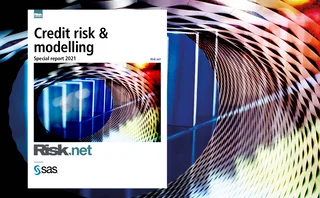
Risk transfer without tears
While collateralisation has become an important element in credit risk management, firms need to be aware of the inherent risks of its widespread use. By Tim Davies

As a concept, collateralisation is not new. Indeed, Shakespeare, in The Merchant of Venice, clearly highlighted some of the issues associated with the extraction of value from a collateralisation relationship.
Today, collateralisation is often regarded as a ‘risk-free’ risk mitigant, a view that can give a false sense of security, especially within a trading environment. This is made clear by
Only users who have a paid subscription or are part of a corporate subscription are able to print or copy content.
To access these options, along with all other subscription benefits, please contact info@risk.net or view our subscription options here: http://subscriptions.risk.net/subscribe
You are currently unable to print this content. Please contact info@risk.net to find out more.
You are currently unable to copy this content. Please contact info@risk.net to find out more.
Copyright Infopro Digital Limited. All rights reserved.
As outlined in our terms and conditions, https://www.infopro-digital.com/terms-and-conditions/subscriptions/ (point 2.4), printing is limited to a single copy.
If you would like to purchase additional rights please email info@risk.net
Copyright Infopro Digital Limited. All rights reserved.
You may share this content using our article tools. As outlined in our terms and conditions, https://www.infopro-digital.com/terms-and-conditions/subscriptions/ (clause 2.4), an Authorised User may only make one copy of the materials for their own personal use. You must also comply with the restrictions in clause 2.5.
If you would like to purchase additional rights please email info@risk.net
More on Credit risk
US bank CROs see only ‘modest’ credit risk from tariffs
Risk Live North America: Lower margins are early sign of stress, but Ally, Citizens and Pinnacle confident on loan books
Credit risk management solutions 2024: market update and vendor landscape
A Chartis report outlining the view of the market and vendor landscape for credit risk management solutions in the trading and banking books
Finding the investment management ‘one analytics view’
This paper outlines the benefits accruing to buy-side practitioners on the back of generating a single analytics view of their risk and performance metrics across funds, regions and asset classes
Revolutionising liquidity management: harnessing operational intelligence for real‑time insights and risk mitigation
Pierre Gaudin, head of business development at ActiveViam, explains the importance of fast, in-memory data analysis functions in allowing firms to consistently provide senior decision-makers with actionable insights
Sec-lending haircuts and indemnification pricing
A pricing method for borrowed securities that includes haircut and indemnification is introduced
XVAs and counterparty credit risk for energy markets: addressing the challenges and unravelling complexity
In this webinar, a panel of quantitative researchers and risk practitioners from banks, energy firms and a software vendor discuss practical challenges in the modelling and risk management of XVAs and CCR in the energy markets, and how to overcome them.
Credit risk & modelling – Special report 2021
This Risk special report provides an insight on the challenges facing banks in measuring and mitigating credit risk in the current environment, and the strategies they are deploying to adapt to a more stringent regulatory approach.
The wild world of credit models
The Covid-19 pandemic has induced a kind of schizophrenia in loan-loss models. When the pandemic hit, banks overprovisioned for credit losses on the assumption that the economy would head south. But when government stimulus packages put wads of cash in…







